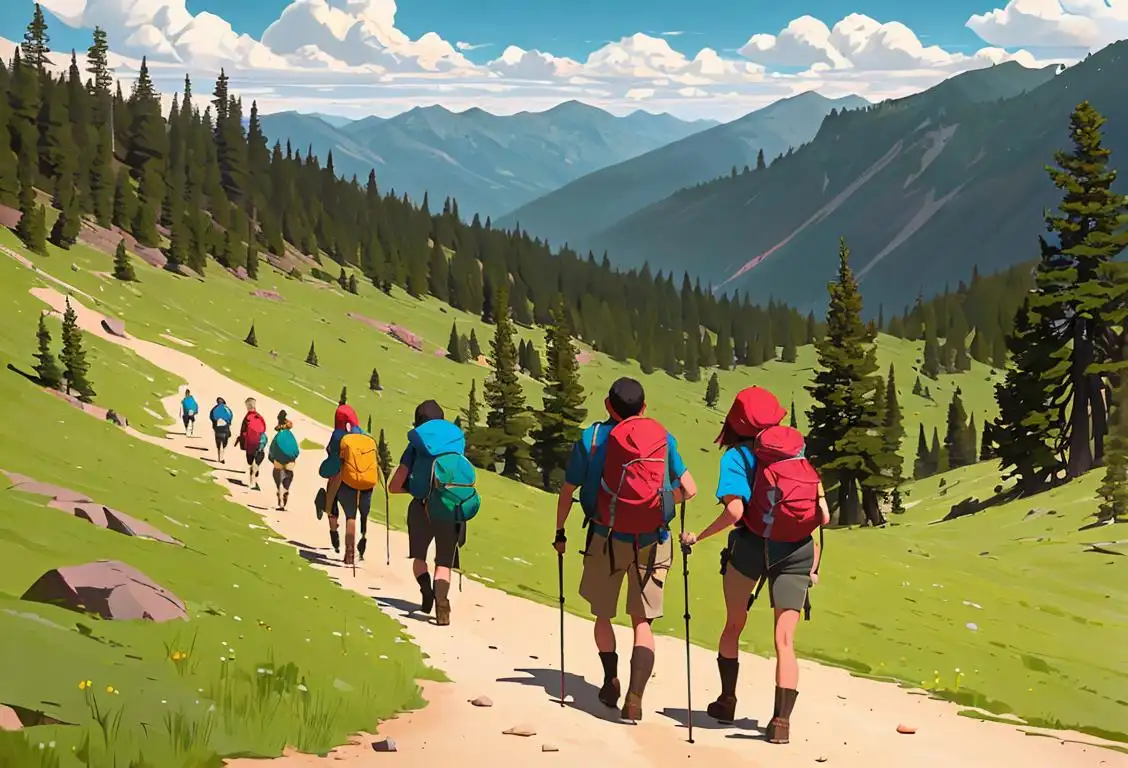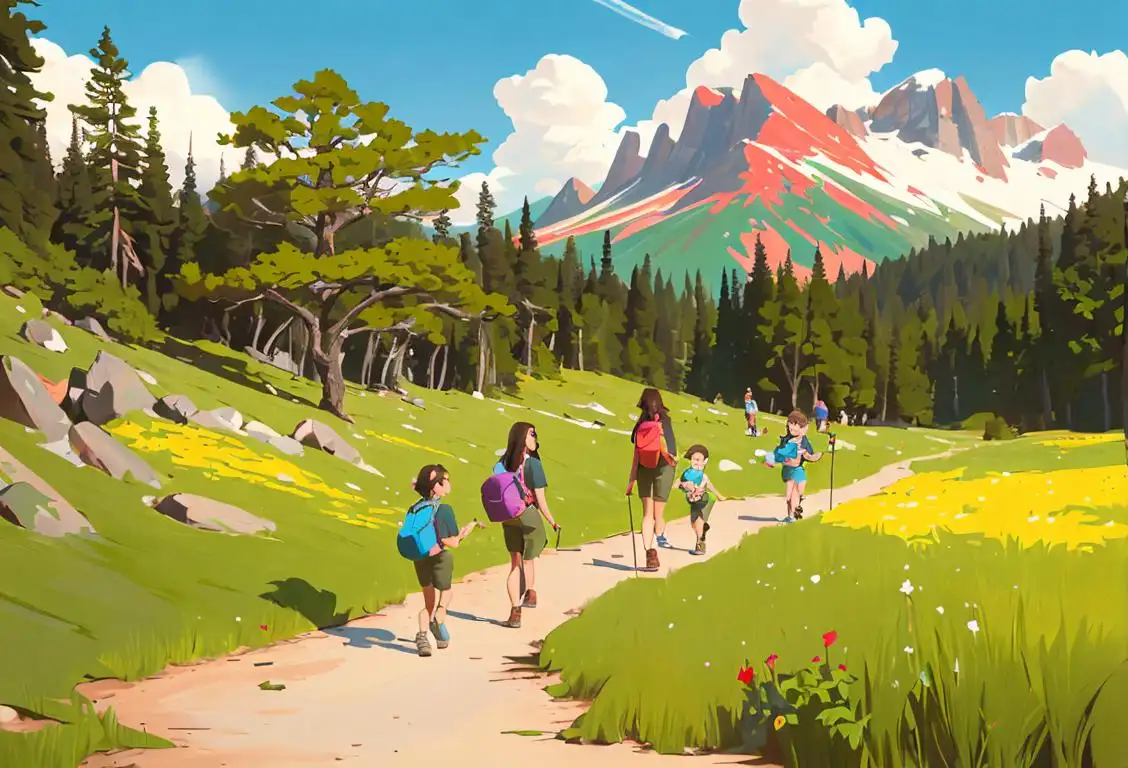National Parks On Public Lands Day

Welcome to WhatNationalDayIsIt.com, where we uncover the fascinating history behind national days! Get ready to explore National Parks on Public Lands Day, a celebration of the stunning natural wonders that belong to everyone.
When is Parks On Public Lands Day?
It's national parks on public lands day on the 28th September.
The Great Outdoors: A National Treasure
On National Parks on Public Lands Day, we honor the majestic landscapes and significant historical sites that make up our country's national parks. These protected areas are not only perfect for outdoor enthusiasts, but they also serve as living classrooms for visitors of all ages.
Every year on the last Saturday in September, people from all walks of life come together to show their appreciation for these breathtaking destinations. From iconic landmarks like Yellowstone and Yosemite to lesser-known gems like Congaree and Isle Royale, there's a national park for everyone to enjoy.
Whether you're an avid hiker, a wildlife enthusiast, or a history buff, national parks offer a wide range of activities and opportunities. Lace up your hiking boots and traverse scenic trails, spot majestic wildlife like bears and eagles, or dive into the captivating stories of the past. And don't forget to bring your camera to capture those once-in-a-lifetime moments!
Preserving Nature's Masterpieces
One of the primary goals of National Parks on Public Lands Day is to raise awareness about the conservation efforts required to protect these natural wonders. From preserving delicate ecosystems to mitigating the impacts of climate change, park rangers and dedicated volunteers work tirelessly to ensure that future generations can experience the beauty and serenity of these landscapes.
Recognized by Congress in 1994, National Parks on Public Lands Day is an opportunity for the public to get involved and make a positive impact. Many events are organized around the country, allowing volunteers to participate in trail restorations, clean-ups, and educational programs. These collective efforts help to preserve and enhance these national treasures.
So, gather your loved ones, pack a picnic, and head out into the great outdoors on National Parks on Public Lands Day. Immerse yourself in the wonders of nature and make unforgettable memories in some of America's most awe-inspiring locations.
History behind the term 'Parks On Public Lands'
1851
Yosemite Grant Act
In 1851, the Yosemite Grant Act was established, providing the first instance of public lands being set aside specifically for preservation and public use. This act paved the way for the concept of parks on public lands as we know them today.
1872
Yellowstone National Park
1872 witnessed another significant milestone in the history of parks on public lands. President Ulysses S. Grant signed the bill designating Yellowstone National Park as the first national park in the United States. It became a model for future parks, inspiring the preservation and conservation of natural landscapes for the enjoyment and education of the public.
1890
Yosemite National Park
In 1890, Yosemite National Park was established, following the footsteps of Yellowstone National Park. The creation of Yosemite National Park further solidified the idea that public lands should be set aside and protected for public enjoyment, preservation, and scientific study.
1906
Creation of the National Park Service
The year 1906 marked the establishment of the National Park Service, an agency dedicated to managing and preserving national parks and their resources for the benefit of present and future generations. This centralized authority ensured consistent practices and facilitated the expansion of parks on public lands across the United States.
1916
Organic Act
The Organic Act of 1916 further solidified the role and purpose of the National Park Service. It defined the agency's mission to conserve park resources and provide opportunities for public enjoyment while maintaining their natural and cultural integrity.
1933
Civilian Conservation Corps (CCC)
During the Great Depression, the Civilian Conservation Corps (CCC) was established as part of President Franklin D. Roosevelt's New Deal. The CCC played a significant role in developing and improving many national parks. This initiative provided employment to young men while enhancing the infrastructure and natural landscapes of parks on public lands.
1969
National Environmental Policy Act
In 1969, the National Environmental Policy Act (NEPA) was signed into law. NEPA requires federal agencies, including the National Park Service, to consider potential environmental impacts when making decisions. This legislation reinforced the responsibility of protecting the environment and ensuring sustainable practices within parks on public lands.
1970
First Earth Day
The first Earth Day in 1970 elevated environmental consciousness and activism across the nation. This nationwide event helped raise public awareness about the value of natural resources, including parks on public lands, and promoted the importance of conservation efforts.
1972
Development of Urban Parks
In the early 1970s, the development of urban parks gained momentum. Recognizing the need for green spaces within cities, efforts were made to establish parks on public lands in urban areas to provide recreational opportunities and enhance the quality of life for urban residents. This expansion broadened the concept of parks beyond remote and wilderness areas.
2006
Centennial Initiative
In 2006, the National Park Service launched the Centennial Initiative in preparation for its 100th anniversary in 2016. This initiative aimed to revitalize and enhance parks on public lands by engaging the public, improving facilities, and leveraging partnerships to secure their future for generations to come.
Did you know?
Did you know that the national park system is often referred to as "America's Best Idea"? This nickname was popularized by the documentary series of the same name, highlighting the incredible value and beauty of these protected areas.Tagged
awareness loved ones natureFirst identified
23rd September 2016Most mentioned on
28th September 2019Total mentions
100Other days
Estuaries Day
Seal Day
Park Every Day
Park On A Gorgeous Sunny Summer Day
Parks On Public Lands Day
Parks One Day
Arbor Day
Parks Are Free Day
Look Up At The Sky Day
Wild Life Day








